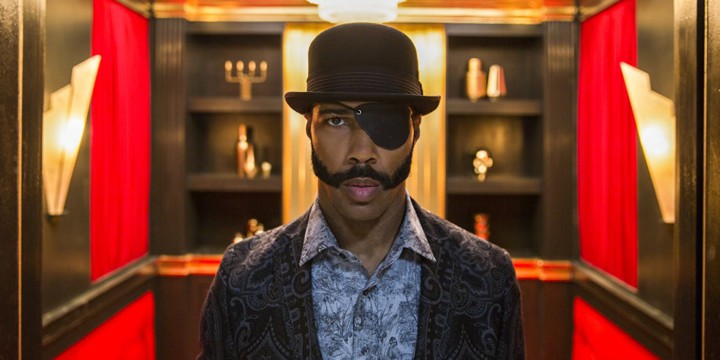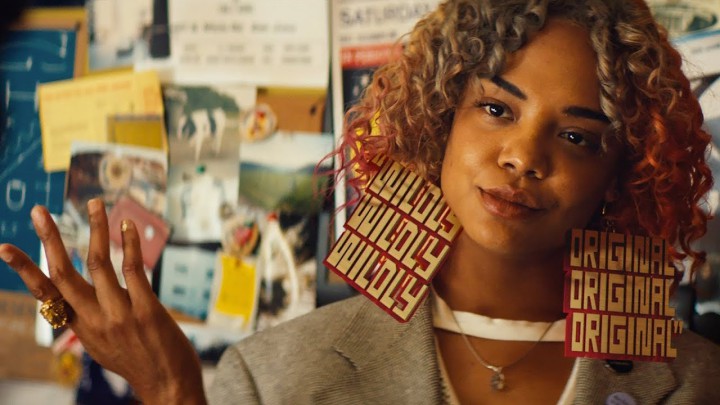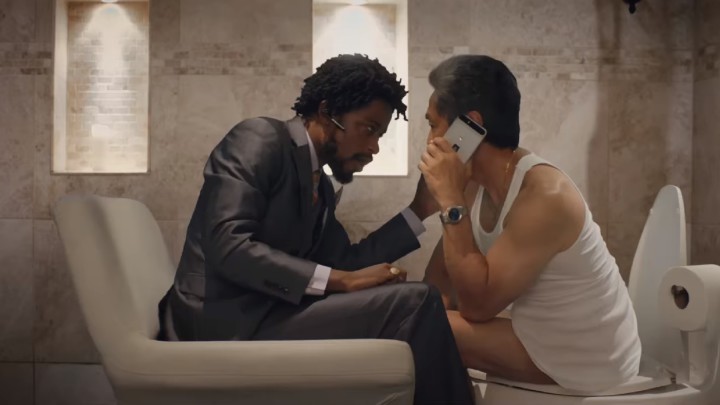The world in which we live could be generously described as insane, and filmmakers (understandably) seem to be following suit. But few films have gone as all-in on that front as Boots Riley’s feature debut, Sorry to Bother You — a scathing socio-political satire the silliness of which is only surpassed by its depth of insight. Writer/director Riley gives no quarter to the systems of power he seeks to undermine, and yet his approach is so bombastically ludicrous that the resultant film never approaches condescension or preachiness. It’s a film that recognizes the inherent absurdity of the modern world writ large and the equally ridiculous idea of protesting that self-evident idiocy with a quasi-sci-fi movie about telemarketing. In a word, it’s hilarious.
Hilarious, yes, but also deeply unsettling. Riley’s story is set in a pseudo-surrealist world where people are offered the option of self-imposed slavery in prisonlike work camps in order to escape crushing debt, and yet no-one seems to bat an eye at this state of affairs. Bother’s protagonist, the aptly named Cassius (Lakeith Stanfield in a standout star turn), is a somewhat feckless unemployed everyman struggling through an existential crisis. When he lands a job at a call center, the advice of a colleague (Danny Glover) to use his “white voice” sets him on a career trajectory that ingratiates him to deranged CEO Steve Lift (Armie Hammer) even as it places him at odds with his activist girlfriend (Tessa Thompson) and unionizing buddy (Steven Yeun). To indulge in further plot summary would be to risk severely detrimental spoilers, but it should suffice to say that what sounds like the setup to a conventional workplace comedy goes in an absolutely inconceivable direction under Riley’s ministrations. Let’s just say things get weird and leave it at that.
Sorry to Bother You is a study in contrasting influences, and Riley blends the constituent elements of his antecedents with a fluency reminiscent of the French New Wave. The film plays something like a cinematic love child fathered by Mike Judge and Spike Jonze that was then raised by Michel Gondry, and I mean that in the best possible sense. It’s worth noting that Riley openly acknowledges this last reference with a mise en abyme stop-motion short attributed to “Michel Dongry” — a move indicative of the film’s sense of humor, simultaneously reverential and nose-thumbing, which Riley brings to bear on subject matter that is anything but lighthearted.
While Sorry to Bother You will undoubtedly draw innumerable comparisons to Jordan Peele’s Get Out — and I have no doubt that the surprise success of that film paved the way for Bother — Riley’s film is a horse of a different color. Its perspective on race, plutocracy and the mind-numbing effects of mass-media inundation are far broader in their scope than the focus of Peele’s film, even if the end result feels less polished. But that very lack of refinement is what makes Bother such a bizarrely impactful experience, one that lingers on the brain long after the uncomfortable laughs subside. The long-term impact of Sorry to Bother You remains to be seen, but as it stands, I can’t imagine a more appropriate artistic statement to capture the cultural zeitgeist of 2018. Rated R for pervasive language, some strong sexual content, graphic nudity, and drug use.
Now Playing at Fine Arts Theatre.








Before you comment
The comments section is here to provide a platform for civil dialogue on the issues we face together as a local community. Xpress is committed to offering this platform for all voices, but when the tone of the discussion gets nasty or strays off topic, we believe many people choose not to participate. Xpress editors are determined to moderate comments to ensure a constructive interchange is maintained. All comments judged not to be in keeping with the spirit of civil discourse will be removed and repeat violators will be banned. See here for our terms of service. Thank you for being part of this effort to promote respectful discussion.